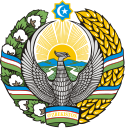
The Kazakh Soviet Socialist Republic, also known as Soviet Kazakhstan, the Kazakh SSR, or simply Kazakhstan, was one of the transcontinental constituent republics of the Soviet Union (USSR) from 1936 to 1991. Located in northern Central Asia, it was created on 5 December 1936 from the Kazakh ASSR, an autonomous republic of the Russian SFSR.
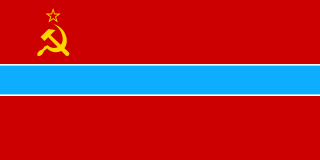
The Uzbek Soviet Socialist Republic, also known as Soviet Uzbekistan, the Uzbek SSR, UzSSR, or simply Uzbekistan and rarely Uzbekia, was a union republic of the Soviet Union. It was governed by the Uzbek branch of the Soviet Communist Party, the legal political party, from 1925 until 1990. From 1990 to 1991, it was a sovereign part of the Soviet Union with its own legislation.

A referendum on the Act of Declaration of Independence was held in Ukraine on 1 December 1991. An overwhelming majority of 92.3% of voters approved the declaration of independence made by the Verkhovna Rada on 24 August 1991. Voters were asked "Do you support the Act of Declaration of Independence of Ukraine?" The text of the Declaration was included as a preamble to the question. The referendum was called by the Parliament of Ukraine to confirm the Act of Independence, which was adopted by the Parliament on 24 August 1991. Citizens of Ukraine expressed overwhelming support for independence. In the referendum, 31,891,742 registered voters took part, and among them 28,804,071 voted "Yes".

Referendums in Transnistria, according to the Transnistrian Constitution, are one of the lawful forms of expression of people's will.

This timeline lists the dates of the first women's suffrage in Muslim majority countries. Dates for the right to vote, suffrage, as distinct from the right to stand for election and hold office, are listed.
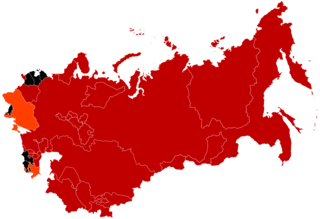
The New Union Treaty was a draft treaty that would have replaced the 1922 Treaty on the Creation of the USSR to salvage and reform the Soviet Union. A ceremony of the Russian SFSR signing the treaty was scheduled for 20 August 1991, but was prevented by the August Coup a day earlier. The preparation of this treaty was known as the Novo-Ogaryovo process, named after Novo-Ogaryovo, a governmental estate where the work on the document was carried out and where Soviet President and CPSU General Secretary Mikhail Gorbachev talked with leaders of Union republics.

An independence referendum was held in the Republic of Georgia on 31 March 1991. It was approved by 99.5% of voters.

The Declaration "On the Restoration of Independence of the Republic of Latvia" was adopted on 4 May 1990 by the Supreme Soviet of the Latvian SSR in which Latvia declared independence from the Soviet Union. The Declaration stated that, although Latvia had de facto lost its independence in 1940, when it was annexed by the Soviet Union, the country had de jure remained a sovereign country as the annexation had been unconstitutional and against the will of the Latvian people.
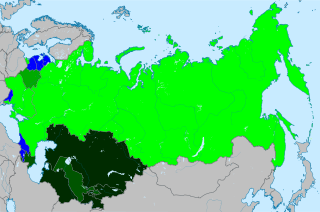
A referendum on the future of the Soviet Union was held on 17 March 1991 across the Soviet Union. It was the only national referendum in the history of the Soviet Union, although it was boycotted by authorities in six of the fifteen Soviet republics.
Direct presidential elections were held for the first time in Uzbekistan on 29 December 1991. Their result was a victory for Islam Karimov of the People's Democratic Party of Uzbekistan, who won with 87% of the vote. Voter turnout was reported to be 94%. The elections were held alongside an independence referendum.

An independence referendum was held in the Armenia SSR on 21 September 1991 to determine whether to secede from the Soviet Union. It followed a declaration of independence on 23 August 1990. 99.5% of voters voted in favour, with a turnout of 95%. The country officially became an independent state on 23 September 1991.

An independence referendum was held in the Turkmen SSR on 26 October 1991.
An independence referendum was held in the Estonian SSR on 3 March 1991, alongside a similar referendum in the Latvian SSR the same day. It was approved by 78.4% of voters with an 82.9% turnout. Independence was restored by the Estonian Supreme Council on the night of 20 August.

An independence referendum was held in the Latvian SSR on 3 March 1991, alongside a similar referendum in the Estonian SSR the same day. Known as the "Popular Survey about the independence of the Republic of Latvia", voters were asked "are you in favour of a democratic and independent Republic of Latvia". It was approved by 74.9% of voters, with a turnout of 87.6%. Latvian Republic civilians registered in Soviet Army units also had the right to vote in this poll.

An independence referendum was held in Lithuania on 9 February 1991, eleven months after independence from the Soviet Union had been declared on 11 March 1990. Just over 93% of those voting voted in favour of independence, while the number of eligible voters voting "yes" was 76.5%, far exceeding the threshold of 50%. Independence was subsequently achieved in August 1991. The independence of the Republic of Lithuania was re-recognized by the United States on 2 September 1991 and by the Soviet Union on 6 September 1991.
Constitutional Assembly elections were held in Colombia on 9 December 1990 alongside a referendum on the Assembly itself. The Assembly sat from February to July 1991 and drew up the 1991 constitution.
A referendum is a direct vote in which an entire electorate is asked to either accept or reject a particular proposal. This article summarises referendum laws and practice in various countries.
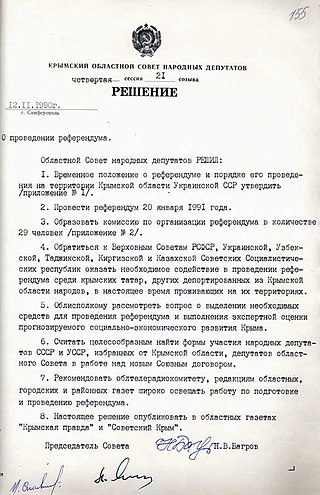
A referendum on sovereignty was held in the Crimean Oblast of the Ukrainian SSR on 20 January 1991, two months before the 1991 All-Union referendum. Voters were asked whether they wanted to re-establish the Crimean Autonomous Soviet Socialist Republic, which had been abolished in 1945. The proposal was approved by 94% of voters.

A sovereignty referendum was held in the Ukrainian SSR on 17 March 1991 as part of a USSR-wide referendum. Voters were asked two questions on reforming the Soviet Union into a confederation of sovereign states. Most voters supported the proposal, although in the pro-independence oblasts of Ivano-Frankivsk, Lviv and Ternopil, voters opted for independence as part of an additional question.
A sovereignty referendum was held in Tatarstan, Russia, on 21 March 1992. Voters were asked whether they approved of Tatarstan being a sovereign state.
